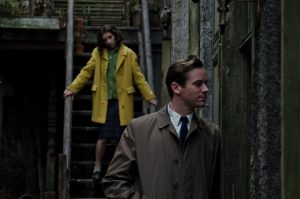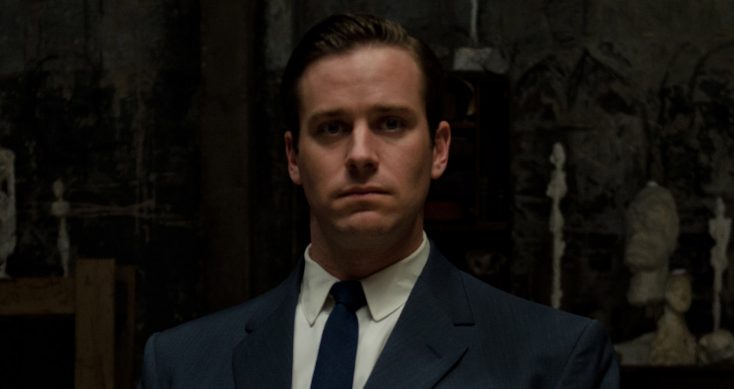
(l-r) Sylvie Testud as Annette Giacometti and Armie Hammer as James Lord in FINAL PORTRAIT. ©Sony Pictures. Cr: Parisa Taghizadeh.
By ANGELA DAWSON
Front Row Features
HOLLYWOOD—Armie Hammer is fresh from his Oscar appearance where he joined host Jimmy Kimmel, Gal Godot, Lupita Nyong’o, Emily Blunt, Margot Robbie and Lin-Manuel Miranda in surprising a theater of ordinary moviegoers with candy, hot dogs and other treats during the live international broadcast. Though Hammer was battling a 24-hour stomach virus, he gamely grabbed a hot dog cannon and shot the snacks to a stunned and grateful audience. (Hopefully, no one in the audience contracted the bug from him.)
“It was just like a 24-hour period where I couldn’t keep anything inside of my body, not to get graphic, but I’m feeling much better now,” he assures a couple of weeks later while promoting his newest film, “Final Portrait.”
In the dramedy, directed and written by Stanley Tucci and based on noted biographer James Lord’s memoir “A Giacometti Portrait,” Hammer plays Lord, who wrote biographies of notable artists including Alberto Giacometti and Pablo Picasso. While visiting Paris in 1964, Lord agrees to sit for a portrait by Alberto Giacometti (played by Oscar and Emmy winner Geoffrey Rush), an offer he can’t refuse. The Swiss-born artist assures Lord the process will only take a few days. However, those few days in the artist’s Paris workshop stretch into weeks, yet Lord obligingly adjusts his own schedule to accommodate him. Meanwhile, Lord gets a first-hand look at Giacometti’s complicated personal life—including the interactions between Giacometti and his wife, his mistress and his brother—while patiently sitting day after day for the artist. (The portrait was the last ever produced by the master, who died in 1966.)
Dressed casually for an interview, the towering Hammer spoke about working alongside Rush and making this remarkable ode to the indefinite process of making art.
Q: After your performance in the acclaimed “Call Me By Your Name,” why did you want to play this role in this film?
Hammer: This was a great opportunity because James Lord is such a fascinating character. And he was such a prolific writer whether it’d be his fictional works or non-fictional works or even his correspondences. I had all of the original letters that he sent back and forth between him and his mother. I had his journals, all that stuff. So, there was a wealth of information that we could draw on to play James Lord. It’s a great character.
Q: There was so much about Lord’s life where you could almost do a separate movie just about him. He had his own thing going on during this time and yet he made this time and allowed himself to be the subject for 19 sittings. From what you gleaned from your research, what was it that motivated him to just kind of stick it out with you just so whenever with this painter that he really wanted to do this?
Hammer: It’s a huge honor when an artist of this sort of reputation and fame and notoriety of Giacometti asks to paint you. Because it is a huge time commitment for the artist. And they don’t paint people that they’re not interested by. There are people all the time, whether it’d be royalty or socialites or whatever, who want to be painted by these artists. Artists have had muses from way back. They say, “I think you are so interesting that I want to spend this much time just staring at you.” And if they don’t think that you’re interesting or worthy of being painted, they won’t paint you. So, the fact that Giacometti even said to Lord, “I want to paint you,” is a huge honor. We don’t get that so much now because we’re in the era of the selfie, where it takes two seconds to get a quick picture. Boom, done.
But this was a serious time commitment for these people. The fact that James Lord was deemed worthy by Giacometti to be painted, he would have done anything in the world for him, especially as an American who’s living in that post-World War II artistic renaissance in Europe.
Q: There was the constant cutting back to your close-up and the interaction between the close-up and the painting in this film. What kind of directions did you receive from Stanley Tucci?
Hammer: Stanley Tucci who directed the film and John Mathieson, the Academy Award winning DP (director of photography), were able to use the camera as the eye of Giacometti. As he was painting James Lord, there would be moments where he would really sort of inspect his face and his visage to make sure that he could paint it and get it.
So, using the camera, it forces the audience to do the exact same thing. There was a lot of conversation between Stanley and I of the fact of sitting for a portrait. You cannot move. So, how do we walk that fine razor’s edge of not being able to move, but also the audience understanding what you are going through and emoting in some way so that the audience feels what you are going through? It was a challenge and it was one of the reasons why I took on this role. More than 60 percent of the movie is me sitting completely still. So how do you make that not boring?
Q: Every time your character makes a phone call to change his plane reservations, there’s a tone in your voice that it’s getting to be a bit much, but still it’s still such an honor. How do you move the audience through those 19 days?
Hammer: Ninety percent of all communication is non-verbal anyway. You pick up body language; you pick up little movements. So, we would just kind of focus on those little things to take the audience along on the journey.
Q: Do you see some parallels between this corporate process and filmmaking in a way because you’re doing take after take, sometimes? Does it depends on the director and the situation? The film doesn’t so much wrap up as it simply stops. Like any piece of art, it’s never really finished, right?
Hammer: Right.
Q: You just have to stop at some point whether it’s writing or painting.
Hammer: That’s what I loved about this film is it allowed me to see the ubiquity of the artistic process. And the fact that everyone who works in a creative medium, whatever it is, whether it’d be writing or film or painting. Whatever your medium is, there is that artistic process.
Something exists in your head and you are trying to get it out in one way or another and it never feels like you’re done. As an actor, it’s a little bit different because there is a sense of finality to it because the second a director says “cut” on the last day, you’re done. You don’t get to act anymore on this project.
He can take that and go into the editing room and continue to cut and tweak. And then he can go into coloring and grading and go into music and all that stuff. So, for the director, the job’s not done, which is why a lot of the times they give the director, “This is your release date.”
So, at a certain point, the studio is going to take this from you so the filmmaker as to quit messing with it so it can be release and shown to audiences. As an actor, though, when they say the day’s shooting is over, you’re kind of like, “Ugh, I wish I would have done.” Every artist goes through their process. The way it manifests itself in Giacometti is he would hit that point and go, “I hate this,” and destroy the painting. You can’t really do that as an actor. You can stop a take if you want, but that never really makes anybody happy.
Q: What can you say about working with Geoffrey Rush?
Hammer: He’s the hardest working actor I have ever worked with in my life. We would shoot all day and at the end of the day I get home and I’d be exhausted and my phone would ring, and I pick it up and I go, “Hello.” And he’d go, “Armie, it’s Geoffrey. What are you doing?” And I’d go, “I just got home, take a shower, have a beer, go to bed.” “Why don’t you come over and we’ll talk about the scenes for tomorrow.” And you want to say, “No, man. I really just want to go to bed.” But Geoffrey Rush just called you and said, “Do you want to rehearse?” And I’d go, “Yes. You know what? I love it. Let’s do it.”
So, you go to his place and you work for several hours going over every single line, every single thing that happens in the scenes. And then you go, “Geoffrey, we’re getting picked up in six hours, man. Can we sleep a little bit?”
Almost every day, we would do that. And then on the weekends, 9:00 a.m. on Saturday my phone would ring. “Armie, it’s Geoffrey. What are you doing today?” It’s like, “It’s Saturday. I’m not doing anything. I’m relaxing.” “Why don’t you come by my place?” I go, “Okay.” And you show up and you sit there for seven or eight hours while he would go over everything. And it was amazing to see someone who is of that level talent still putting that much work and effort into it and it’s really refreshing.
Q: What are some of the films that influenced you as a child that made you want to be an actor?
Hammer: I grew up on a small island in the Caribbean (the Cayman Islands). So, for me, like sitting in a theater and then being taken to somewhere else whether it’d be the deck of the Titanic or Mars or the wild west or whatever it was. It just it was such a transportive magical experience to sit and watch a film and I just thought, “That is special. There’s something amazing in that.” And I still feel that same way. I still have the same love for film. I try to watch a movie every day. I love film. I just love watching movies.
Q: You say you want to watch movie as much as possible, but you’re a married father of two. What movie you want to watch with your kids?
Hammer: The last movie I watched with my kids was “Coco.” We watched that two nights ago. I’m excited about giving my kids a film education. When they get old enough and they can appreciate and sit through film, I’ve got tons of stuff I want to show them. My kids will know a lot about film just by osmosis. My love of film will hopefully translate.





